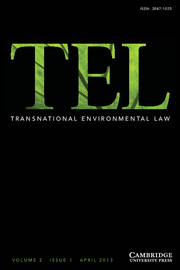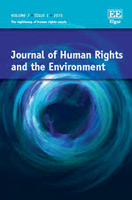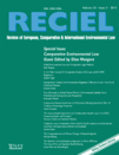
Transnational Environmental Law
Scope & Guideline
Exploring the nexus of law and transnational environmental challenges.
Introduction
Aims and Scopes
- Transnational Environmental Governance:
The journal emphasizes the role of transnational legal frameworks in addressing global environmental issues, exploring how international, regional, and local laws can interact to foster environmental protection and sustainability. - Interdisciplinary Approaches:
Papers often integrate legal analysis with insights from political science, economics, and environmental science, allowing for a comprehensive understanding of complex environmental challenges. - Rights of Nature and Environmental Justice:
A significant focus is placed on the emerging concept of the rights of nature, examining how legal systems can recognize and enforce the rights of natural entities, as well as addressing issues of environmental justice for marginalized communities. - Climate Change and Mitigation Strategies:
The journal frequently publishes research on legal mechanisms for climate change mitigation, adaptation policies, and the accountability of states and corporations in reducing greenhouse gas emissions. - Regulatory Innovations in Environmental Law:
Exploration of innovative regulatory approaches, such as public-private partnerships and community-based governance, to enhance environmental protection and compliance.
Trending and Emerging
- Climate Litigation and Human Rights:
An increasing number of papers address the intersection of climate change litigation and human rights, highlighting how legal frameworks can be leveraged to protect the rights of vulnerable populations impacted by environmental degradation. - Rights of Nature:
The concept of rights of nature is gaining traction, with more research exploring legal recognition for ecosystems and natural entities, suggesting a paradigm shift in how we view environmental protection. - Global Plastic Pollution and Regulation:
The issue of plastic pollution has emerged as a significant theme, with research focusing on regulatory frameworks and international cooperation to combat this pervasive environmental challenge. - Innovative Governance Models:
There is a growing trend toward exploring new governance models, including community-based and participatory approaches that engage local populations in environmental decision-making. - Intersectionality in Environmental Law:
Emerging discussions on intersectionality reflect an increasing awareness of how various social factors, such as race, gender, and socio-economic status, intersect with environmental issues, leading to more equitable legal approaches.
Declining or Waning
- Traditional Environmental Law:
There is a noticeable decline in publications focusing solely on traditional environmental law frameworks, as the journal shifts towards more innovative and interdisciplinary approaches. - State-Centric Approaches:
Research emphasizing state-centric environmental governance is becoming less prevalent, indicating a move towards recognizing the importance of non-state actors and transnational networks in environmental law. - Conventional Regulatory Mechanisms:
The focus on conventional regulatory mechanisms is diminishing, with more emphasis being placed on adaptive and flexible governance structures that can respond to environmental changes.
Similar Journals

Journal of Human Rights and the Environment
Innovating Solutions for Human Rights and the EnvironmentJournal of Human Rights and the Environment, published by Edward Elgar Publishing Ltd, serves as a premier platform for scholarly discourse at the intersection of human rights and environmental sustainability. This UK-based journal, with ISSN 1759-7188 and E-ISSN 1759-7196, focuses on critical issues surrounding the legal frameworks that govern human rights within the context of environmental protection. With a commendable impact reflected in its Q1 ranking in Law and Q2 in Sociology and Political Science as of 2023, the journal is recognized for its rigorous peer-reviewed articles that contribute significantly to ongoing debates in these fields. The Scopus rankings place it within the top 15% among Social Sciences in Law and 28% in Sociology and Political Science, underscoring its relevance and influence. As an essential resource for researchers, practitioners, and students alike, the journal not only advances academic knowledge but also seeks to inform policy-making and advocacy efforts globally, fostering a deeper understanding of the interconnectedness of human rights and environmental issues.

Chinese Journal of Environmental Law
Empowering Voices in Environmental Legal DiscourseChinese Journal of Environmental Law, published by BRILL, is a leading interdisciplinary journal that focuses on the intersection of environmental issues and legal frameworks within the context of China and beyond. With an ISSN of 2468-6034 and an E-ISSN of 2468-6042, it has been a vital contribution to the field since its inception in 2017. The journal aims to provide a platform for researchers, policy-makers, and practitioners to discuss and analyze the evolving landscape of environmental law, particularly in the context of management and policy implications. Notable for its academic rigor, it holds a Q2 ranking in Law and a Q3 ranking in Management, Monitoring, Policy and Law. In 2023, the journal was ranked at #516 out of 1025 in Social Sciences - Law and #328 out of 399 in Environmental Science. Although not open access, it is accessible through various academic institutions, making it a critical resource for anyone interested in shaping sustainable legal practices. The Chinese Journal of Environmental Law is set to continue its convergence of knowledge through 2024, reflecting its commitment to publishing cutting-edge research that influences both policy and practice.

Revista Juridica de Castilla y Leon
Catalyzing Change in the Legal Landscape of SpainRevista Juridica de Castilla y Leon is a prestigious academic journal dedicated to advancing legal scholarship in the field of law and governance. Published by the JUNTA CASTILLA & LEON, CONSEJERIA PRESIDENCIA & ADM TERRITORIAL, this journal plays a vital role in disseminating high-quality research and foster dialogue among legal practitioners, researchers, and students alike. Since transitioning to Open Access in 2003, it has removed barriers to knowledge, allowing a global audience uncontrolled access to innovative legal studies and practices. With its ISSN 1696-6759 and E-ISSN 2254-3805, the journal is committed to publishing articles that address contemporary issues and challenges in the legal landscape, particularly those relevant to the Spanish context. As a reliable source for its readers, Revista Juridica de Castilla y Leon contributes significantly to the field of law, encouraging interdisciplinary research and collaboration to influence policy and improve legal frameworks in Spain and beyond.

Ius Humani-Revista de Derecho
Empowering Legal Minds Through Open AccessIus Humani-Revista de Derecho, published by Universidad Hemisferios, serves as a vital platform for discourse in the field of human rights law and its various dimensions. With an Open Access policy established since 2008, this journal ensures that scholarly articles, critical reviews, and original research are readily accessible to a global audience, fostering collaboration and innovation among researchers, professionals, and students alike. Although the journal is based in Quito, Ecuador, its reach extends internationally, making significant contributions to the understanding and application of human rights in legal frameworks. While it is still developing in terms of its HIndex and Scopus rankings, Ius Humani is poised to provide essential insights and discussions that reflect pressing legal issues and emerging trends in human rights law. Join the community of scholars engaging with this important field through Ius Humani, where knowledge is freely shared and impactful conversations are sparked.

ECOLOGY LAW QUARTERLY
Exploring the nexus of law and environmental stewardship.ECOLOGY LAW QUARTERLY is a distinguished journal published by the University of California, Berkeley School of Law, focusing on the intersection of environmental law and ecological science. With a commitment to exploring critical legal and policy issues surrounding environmental protection and sustainability, this journal aims to provide a platform for innovative research and discourse. Though it holds an impact factor reflective of its Q4 in Environmental Science and Q3 in Law category quartiles, it remains a significant resource for legal scholars and practitioners alike, offering insight into contemporary legal challenges in environmental contexts. The quarterly has adapted to evolving academic standards since its inception in 1973, continuing to publish vital research that shapes policy and legal frameworks. Interested academics and practitioners can access the journal's content through the university's archives, ensuring a repository of knowledge crucial for advancing the fields of law and environmental science.

Legal Pluralism and Critical Social Analysis
Bridging Diverse Legal PerspectivesLegal Pluralism and Critical Social Analysis is a leading journal published by Routledge Journals, Taylor & Francis Ltd, dedicated to exploring the complex intersections of law and society amidst an increasingly pluralistic landscape. With an ISSN of 2770-6869 and an E-ISSN of 2770-6877, this journal provides a platform for innovative research and critical analysis in the field of law, capturing diverse perspectives and challenges within legal frameworks. As a member of the Q4 quartile in 2023 and ranked 796 out of 1025 in the Scopus Social Sciences Law category, it offers a critical resource for scholars, practitioners, and students keen on understanding the nuances of legal pluralism from 2022 to 2024. Although currently not an open-access journal, its insights are vital for advancing discourse on the relationships between legal systems and social dynamics in the context of global change. This journal is instrumental in shaping contemporary legal scholarship and ensuring that diverse voices contribute to the evolving narrative of law in society.

HARVARD ENVIRONMENTAL LAW REVIEW
Advancing Insights in Environmental LegislationHarvard Environmental Law Review, issued by Harvard Law School, stands as a pivotal academic journal devoted to the intersection of environmental law and policy, offering critical insights since its establishment in 1979. With an ISSN of 0147-8257, this journal rigorously addresses contemporary challenges through scholarly articles, case studies, and reviews, thus fostering a rich dialogue among researchers, practitioners, and students alike. Although not an open-access journal, it remains influential, evidenced by its Scopus rankings which position it within the 68th percentile in Law and 35th percentile in Environmental Science categories. Moreover, its classification into the Q4 quartile in Environmental Science (miscellaneous) and Q3 quartile in Law reflects its critical role in advancing knowledge and discourse in both fields. With comprehensive coverage from 1979 to 2023, the journal continues to be indispensable for those seeking to navigate the complex terrain of environmental legislation and policies, underscoring its relevance in scholarly and practical realms.

Dixi
Advancing Understanding of Complex Social IssuesDixi is an esteemed academic journal published by UNIV COOPERATIVA COLOMBIA, focusing on a wide range of disciplines within the humanities and social sciences. Since its transition to Open Access in 2012, Dixi has committed to democratizing knowledge by providing a platform for researchers and scholars to disseminate their findings without barriers. The journal is dedicated to fostering interdisciplinary dialogue and is particularly well-regarded for its contributions to cultural studies, sociology, and educational research. Located in Bucaramanga, Santander, Colombia, Dixi aims to engage a global audience of researchers, professionals, and students eager to advance their understanding of complex social issues. With its accessible format and commitment to rigorous peer review, Dixi is a vital resource for those seeking to enrich their academic work and influence contemporary discussions in their respective fields.

German Law Journal
Bridging Tradition and Innovation in LawGerman Law Journal, published by Cambridge University Press, stands as a leading open-access platform for scholarly discourse in the field of law, having made its content freely available since 2019. With an impressive impact factor that places it in the Q1 category for Law as of 2023, and a robust Scopus ranking of #164 out of 1025 in the social sciences category, this journal is recognized for its high-quality research and significant contributions to legal scholarship. The journal encompasses a wide array of topics pertinent to the German legal system, European Union law, and comparative legal studies, thus catering to researchers, legal practitioners, and students alike. Located in the heart of the UK, at Edinburgh Building, Shaftesbury Rd, Cambridge, this journal not only fosters academic engagement but also promotes interdisciplinary dialogues that enrich the understanding of legal principles in an evolving global context. Emphasizing accessibility and high academic standards, the German Law Journal serves as an essential resource for those seeking to explore and contribute to contemporary legal discussions.

Review of European Comparative & International Environmental Law
Exploring innovative solutions for pressing environmental challenges.Review of European Comparative & International Environmental Law is a leading academic journal published by WILEY that serves as a vital platform for scholars and practitioners in the fields of environmental law, geography, and policy analysis. With its ISSN 2050-0386 and E-ISSN 2050-0394, it provides comprehensive insights into the comparative and international aspects of environmental legislation and governance. The journal is noted for its rigorous peer-review process and has achieved commendable rankings, including Q1 in Law and Q2 in Geography, Planning, and Development in the 2023 category quartiles. Furthermore, it holds impressive Scopus rankings, placing it within the 92nd percentile for social sciences law. The scope of the journal encompasses interdisciplinary research addressing contemporary environmental challenges, making it an invaluable resource for those engaged in the development, monitoring, and policy-making around environmental law. Published since 2013 and continuing through 2024, Review of European Comparative & International Environmental Law plays a crucial role in fostering scholarly dialogue and influencing environmental policy worldwide, ensuring access to state-of-the-art research and innovative solutions for a sustainable future.